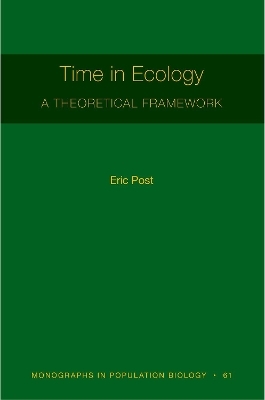
Time in Ecology
A Theoretical Framework
Seiten
2019
Princeton University Press (Verlag)
978-0-691-18235-3 (ISBN)
Princeton University Press (Verlag)
978-0-691-18235-3 (ISBN)
Ecologists traditionally regard time as part of the background against which ecological interactions play out. In this book, Eric Post argues that time should be treated as a resource used by organisms for growth, maintenance, and offspring production.Post uses insights from phenology-the study of the timing of life-cycle events-to present a th
Ecologists traditionally regard time as part of the background against which ecological interactions play out. In this book, Eric Post argues that time should be treated as a resource used by organisms for growth, maintenance, and offspring production.
Post uses insights from phenology—the study of the timing of life-cycle events—to present a theoretical framework of time in ecology that casts long-standing observations in the field in an entirely new light. Combining conceptual models with field data, he demonstrates how phenological advances, delays, and stasis, documented in an array of taxa, can all be viewed as adaptive components of an organism’s strategic use of time. Post shows how the allocation of time by individual organisms to critical life history stages is not only a response to environmental cues but also an important driver of interactions at the population, species, and community levels.
To demonstrate the applications of this exciting new conceptual framework, Time in Ecology uses meta-analyses of previous studies as well as Post’s original data on the phenological dynamics of plants, caribou, and muskoxen in Greenland.
Ecologists traditionally regard time as part of the background against which ecological interactions play out. In this book, Eric Post argues that time should be treated as a resource used by organisms for growth, maintenance, and offspring production.
Post uses insights from phenology—the study of the timing of life-cycle events—to present a theoretical framework of time in ecology that casts long-standing observations in the field in an entirely new light. Combining conceptual models with field data, he demonstrates how phenological advances, delays, and stasis, documented in an array of taxa, can all be viewed as adaptive components of an organism’s strategic use of time. Post shows how the allocation of time by individual organisms to critical life history stages is not only a response to environmental cues but also an important driver of interactions at the population, species, and community levels.
To demonstrate the applications of this exciting new conceptual framework, Time in Ecology uses meta-analyses of previous studies as well as Post’s original data on the phenological dynamics of plants, caribou, and muskoxen in Greenland.
Eric Post is professor of climate change ecology and fellow of the John Muir Institute at the University of California, Davis. He is the author of Ecology of Climate Change: The Importance of Biotic Interactions (Princeton) and the coeditor of Wildlife Conservation in a Changing Climate.
| Erscheinungsdatum | 16.02.2019 |
|---|---|
| Reihe/Serie | Monographs in Population Biology |
| Zusatzinfo | 57 b/w illus., 1 tables |
| Verlagsort | New Jersey |
| Sprache | englisch |
| Maße | 155 x 235 mm |
| Themenwelt | Naturwissenschaften ► Biologie ► Botanik |
| Naturwissenschaften ► Biologie ► Ökologie / Naturschutz | |
| Naturwissenschaften ► Biologie ► Zoologie | |
| ISBN-10 | 0-691-18235-3 / 0691182353 |
| ISBN-13 | 978-0-691-18235-3 / 9780691182353 |
| Zustand | Neuware |
| Informationen gemäß Produktsicherheitsverordnung (GPSR) | |
| Haben Sie eine Frage zum Produkt? |
Mehr entdecken
aus dem Bereich
aus dem Bereich
Gefäßpflanzen: Grundband
Buch | Hardcover (2021)
Springer Spektrum (Verlag)
44,99 €
Diversität, Morphologie, Ökologie und Evolution der Pilze
Buch | Softcover (2023)
Springer (Verlag)
49,99 €
ein Baum erzählt seine erstaunliche Geschichte
Buch | Hardcover (2024)
Ludwig (Verlag)
23,00 €


